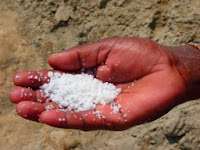Many of us are aware that we shouldn’t eat too much salt. To be precise, adults should avoid eating over 6g (or around about a teaspoon of salt) a day.The World Health Organisation (WHO), however, estimates that the current global average intake of salt is between 9g and 12g per day. This seems significantly higher than recommended.But why is salt really so bad for us? What does it do to the body?
What exactly is salt?
Salt is in fact sodium chloride and is a necessary mineral for a healthy human body.The fact that salt is made up of sodium chloride can actually make food labels quite confusing. This is because sometimes the labels will only give the amount of sodium in the food and not the amount of salt.Luckily, there is an easy equation you can use to calculate how much salt you are consuming. Simply multiply the sodium content by 2.5:-Salt = sodium x 2.5
Why do we need salt?
Besides adding flavour to our food, salt actually plays important roles in the body. It is the most common source of sodium and chloride ions, which cannot be made by the body itself and so need to be consumed through our food intake.Sodium plays a significant role in the body. In particular, it regulates volumes of fluid in the body. It also aids the uptake of various other nutrients into cells.The normal pH, or acid-base level, of the blood is also influenced by the sodium levels in the body.All in all, these cellular level processes mean that sodium can play a larger role in transmitting nerve signals in the body and aiding muscular contraction. You, perhaps, may have even noticed sodium’s role in the latter, if you have ever experienced cramp after exercising and sweating.Chloride ions also play important roles within the body. They, like sodium, are involved with influencing fluid movements and pH levels in the body.In addition, chloride ions are important in digestion; for the stomach contains a naturally produced acidic fluid, which is partly made of hydrochloric acid. This acidic fluid, to which chloride ions contribute, plays an essential role in digestion.
What’s wrong with eating too much salt?
If salt plays such important roles in the body, then why is it bad to have too much of it?Well because it plays such crucial roles in the body, salt is also very good at having powerful negative effects too. In fact, a diet high in salt has been linked to several conditions.
Hypertension (High Blood Pressure)
There is lots of different evidence supporting a link between high salt intake and high blood pressure.It is thought that having high levels of sodium in the body causes a decrease in the synthesis of nitric oxide. Nitric oxide is an arteriolar vasodilator. This means that it causes the blood vessels to widen, reducing the resistance the blood experiences as it flows.Sodium is thought to do this by increasing the levels of a molecule called asymmetric dimethyl L-arginine. This molecule is an inhibitor of nitric oxide production, and thus sodium indirectly causes the reduction of nitric oxide biosynthesis.
Overall then, this means that there is less nitric oxide. Consequently, the blood vessels are not as wide and thus the blood experiences more resistance, causing higher blood pressure.Why is high blood pressure, or hypertension, such a bad thing?Well, although hypertension frequently does not exhibit many symptoms. The condition can lead to several medical problems including heart attack, stroke and kidney damage.
Osteoporosis
High salt intake has also been linked to osteoporosis, a condition that causes weakening of the bones making them more susceptible to fractures.
Salt is proposed to affect bones by causing increased calcium excretion in urine. Calcium is, of course, very important in bones. In fact, 99% of the body’s calcium is stored in our bones. Thus, loss of calcium, through excessive excretion, is bad for your bones.
Stomach Cancer
Although salt is necessary in the production of stomach acid; it seems too much salt can actually be bad news for the stomach.Excessive salt consumption has been linked to stomach cancer. Although the molecular basis has not yet been confirmed and not all results of epidemiological studies were in agreement, there has been a general trend observed that high salt consumption was correlated with increased risk of stomach cancer.
How can we reduce our salt intake?

